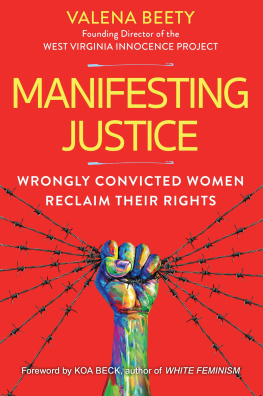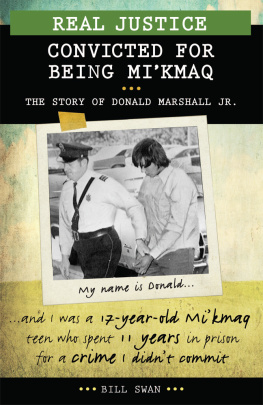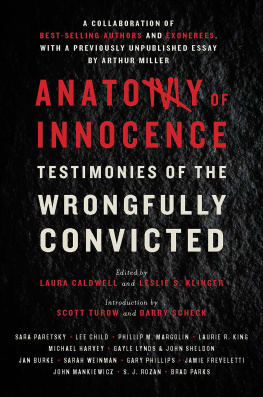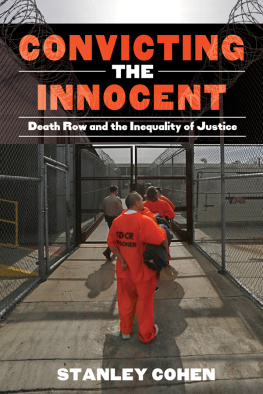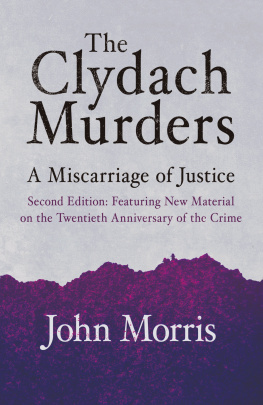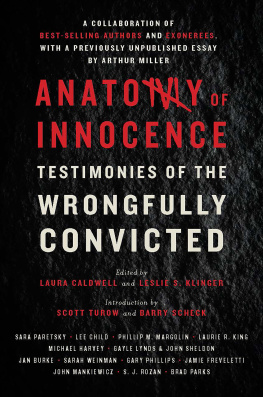If it takes a village to raise a child, it takes a supportive community of family and friends to publish a book. Tracey Arial made helpful suggestions about structuring the books sections. Julie Barlow, author of Sixty Million Frenchmen Cant Be Wrong and The Story of French read my book proposal and offered valuable advice. Agent Robert Mackwood found a receptive publisher with Michael Carroll at Dundurn. Marian Scott dug around for some of the articles I needed while researching the book. Many thanks to photographers Milan Chvostek, Linda Martin, and Michael Di Massa for kindly traipsing out to take some photos for the book. My thanks also to Sandra Phinney, Tourism Hamilton, Justices Alexander Hickman, Fred Kaufman, Stephen Goudge, and Dr. Michael Pollanen for graciously contributing photos.
Halifax lawyer Dale Dunlop, who had more than enough work on his own plate, was kind enough to read the manuscript for legal accuracy. If any errors remain, they are entirely my own. He also took me on fascinating trips down memory lane with his connections to virtually every story. My sister Catherine Katz, who has been watching over me since I was born, eyeballed the manuscript and provided valuable suggestions for improving the text. Editor Nicole Chaplin asked for clarifications in the right spots. My partner in life, Mike Couvrette, spent months looking at my back as I lived at the computer. He kept me fed and watered throughout and handled some of my chores at our alpaca farm as the manuscript deadline loomed.
Appendix A
Other Cases of Wrongful Conviction in Canada
In Chronological Order
Steven Truscott was fourteen years old when the body of a schoolmate was found near a Clinton, Ontario, air force base in June 1959. Twelve-year-old Lynne Harper had been raped and strangled to death. Police focused their attention on Truscott, who had given Harper a bicycle ride before her death. They did not inquire about other possible suspects. Truscott was tried three months later, found guilty, and sentenced to hang. His death sentence was commuted to life in prison. He was released in 1969, moved to Guelph, Ontario, and adopted a new identity. The federal justice minister referred his case to the Ontario Court of Appeal, which overturned his conviction in August 2007. In July 2008, the Ontario government announced that it would pay Truscott $6.5 million in compensation.
Rjean Hinse was convicted in 1964 of an armed robbery in Mont-Laurier, Quebec, in 1961. He was sentenced to fifteen years in prison, partly on the basis of eyewitness testimony. He spent five years in prison but continued to seek exoneration. The Supreme Court of Canada acquitted him in 1997. Following a lawsuit against the Quebec and federal governments, Hinse was awarded $13.1 million in April 2011.
Romeo Phillion was convicted in 1972 of the stabbing death of Ottawa firefighter Leopold Roy in August 1967. He had confessed while in custody on a robbery charge, then immediately recanted and continued to maintain his innocence. He spent thirty-one years in prison. In 2009, the Ontario Court of Appeal struck down Phillions conviction and ordered a new trial, in part because a police report that Phillion had been 200 kilometres away from the murder when it occurred was never given to his defence lawyer. In April 2010, the Crown withdrew the charges.
Erin Walsh was convicted of second-degree murder in the 1975 killing of Melvin (Chi Chi) Peters in Saint John, New Brunswick. He was sentenced to life in prison with no parole for ten years. His appeals to the New Brunswick Court of Appeal were dismissed in 1982. New evidence surfaced in 2006, from jailhouse conversations, which suggested that someone else had shot Peters. In 2008, the New Brunswick Court of Appeal acquitted Walsh and overturned his conviction, clearing his name. He died of colon cancer on October 14, 2010.
Norman Fox was sentenced to ten years in prison in 1976 in Vancouver for rape and related offences. He served eight years in prison. He was granted a pardon in 1984 after new evidence indicated that he had been mistakenly identified. He received $275,000 in compensation.
Richard Norris was convicted of sexual assault in 1980 after the Fergus, Ontario, victim mistakenly identified him as her assailant. He served eight months in jail and was acquitted in 1991 after an acquaintance admitted that he had assaulted the woman. Norris was awarded $507,000 two years later.
Benoit Proulx was convicted in 1991 of murdering his former girlfriend, nineteen-year-old France Alain. The Quebec Court of Appeal said there wasnt enough evidence to support a conviction and he was acquitted in 1992. He sued Quebecs attorney general for malicious prosecution and was awarded $1.1 million.
Ivan Henry was convicted in British Columbia in 1983 on ten counts of rape and indecent assault involving eight women. He was acquitted in 2010 after serving twenty-seven years in prison. The appeal court found the witness identifications weak and that the trial judge erred in his instructions to the jury.
Wilfred Truscott was convicted of assault and mischief causing damage to personal property. He was sentenced to eighteen months in jail in 1984. It was later learned that the complaint had been fabricated. The Alberta government awarded him $36,000 in compensation in 1986.
Anthony Hanemaayer was charged with assault after a fifteen-year-old girl was attacked at knifepoint in Toronto. On the advice of his lawyer, he pleaded guilty to avoid a lengthy sentence and was sentenced to two years less a day in jail. In a prison interview in 2006, convicted murderer and rapist Paul Bernardo confessed to the crime. The Ontario Court of Appeal acquitted Hanemaayer on June 25, 2008.
Michael McTaggert was convicted of armed bank robbery, but his conviction was overturned in 1990 after it was learned that a string of robberies, similar to the one of which he was accused, had continued while he was in jail. Evidence surfaced in 2000 that the prosecution had failed to tell his defence lawyer that two bank tellers had identified another man. In 2001, he was awarded $380,000 in compensation for his twenty months of imprisonment.
Peter Frumusa was convicted of first-degree murder in the 1988 killing of a Niagara couple, largely on the testimony of a jailhouse informant. He was sentenced to twenty-five years in prison. The Ontario Court of Appeal ordered a new trial in 1996, and the charges were withdrawn in 1998. He had served eight years in prison.
Jack White was charged with sexual assault in 1993 after a co-worker alleged that he had seen White assault a patient at the mental health care facility where they both worked. The patient was unable to speak. White was convicted in 1995 after a trial that lasted less than two hours. The Superior Court of Ontario withdrew the charges on November 26, 2010, after it was demonstrated that Whites accuser had ample reason to lie.
James Driskell was convicted of shooting his friend Perry Harder in the chest several times in September 1990. He was sentenced to life in prison. The RCMP said they had found three of Harders hairs in Driskells van. Subsequent tests performed in Britain found that none of the hairs were Harders. The federal justice minister quashed the conviction in 2005 and ordered a new trial. The Manitoba government decided instead to end the case. Driskell was awarded $4-million in compensation.


